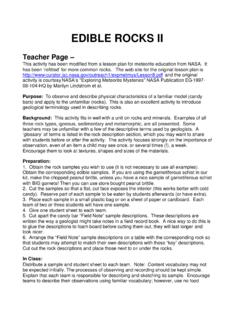Transcription of VIRTUAL LAB How are rocks classified?
1 1 Name:_____Date:_____Page:_____ VIRTUAL LAB How are rocks classified ? ( ) I. Objective: - Classify rocks according to their origins (igneous, metamorphic, or sedimentary) - Identify different types of igneous, metamorphic, and sedimentary rocks . II. Procedure: 1. Click the video button. Watch the presentation to learn about igneous, metamorphic, and sedimentary rocks . Observe how rocks are formed and compare their different characteristics. 2. Click and drag a rock sample to the test plate. 3. Drag the magnifying glass over the rock sample to determine whether it is igneous, metamorphic or sedimentary. Review the presentation if you need more help. 4. Take the rock to the appropriate Rock Testing Lab by clicking the door you want to enter. Only the door to the correct lab will open.
2 Use your Journal to record how you determined the correct testing lab. 5. Igneous Rock Testing Lab: Drag the magnifying glass over the rock sample to get a close-up view. Click the posters on the wall to get specific information about the igneous rocks . Use the left and right arrows to page through the information on the poster. Metamorphic Rock Testing Lab: Drag the magnifying glass over the rock sample to get a close-up view. Click the posters on the wall to get specific information about the metamorphic rocks . Use the left and right arrows to page through the information on the poster. Remove the magnifying glass from the rock sample. Drag the rock sample over the piece of glass. Sedimentary Rock Testing Lab: Drag the magnifying glass over the rock sample to get a close-up view.
3 Click the posters on the wall to get specific information about the sedimentary rocks . Use the left and right arrows to page through the information on the poster. Then click the 5% HCl Solution bottle to place a drop of HCl on the rock sample. If no reaction occurs after the hydrochloric acid is dropped on the rock, the result is negative. Write observations in your journal (page 2). 6. Open the table and compare your observation about your rock sample to the data in the Table. Determine the identify of the mystery rock. 7. Click the door to return to the Main Lab. Click the arrow on the front of the test plate. Select the name of the mystery rock. Click check. 8. Repeat the activity several times. After testing various rocks , complete the journal questions. 2 III: Journal IGNEOUS your guess:_____ Glassy Appearance: Yes or No Holes?
4 Yes or No Color: _____ Crystal Size: large, small or none your guess:_____ Glassy Appearance: Yes or No Holes? Yes or No Color: _____ Crystal Size: large, small or none your guess:_____ Glassy Appearance: Yes or No Holes? Yes or No Color: _____ Crystal Size: large, small or none your guess:_____ Glassy Appearance: Yes or No Holes? Yes or No Color: _____ Crystal Size: large, small or none your guess:_____ Glassy Appearance: Yes or No Holes? Yes or No Color: _____ Crystal Size: large, small or none METAMORPHIC your guess:_____ Recrystallization: Yes or No Scratch glass? Yes or No Banding: Yes or No General Appearance: large, small or none your guess:_____ Recrystallization: Yes or No Scratch glass? Yes or No Banding: Yes or No General Appearance: large, small or none your guess:_____ Recrystallization: Yes or No Scratch glass?
5 Yes or No Banding: Yes or No General Appearance: large, small or none your guess:_____ Recrystallization: Yes or No Scratch glass? Yes or No Banding: Yes or No General Appearance: large, small or none your guess:_____ Recrystallization: Yes or No Scratch glass? Yes or No Banding: Yes or No General Appearance: large, small or none SEDIMENTARY your guess:_____ Sediment size: _____mm Reacts with HCl? Yes or No Sediment Type: your guess:_____ Sediment size: _____mm Reacts with HCl? Yes or No Sediment Type: your guess:_____ Sediment size: _____mm Reacts with HCl? Yes or No Sediment Type: your guess:_____ Sediment size: _____mm Reacts with HCl? Yes or No Sediment Type: your guess:_____ Sediment size: _____mm Reacts with HCl? Yes or No Sediment Type: 3 IV: Questions 1) For each rock sample you tested, how did you decide which testing lab to use?
6 _____ 2) What observations did you make about your rock samples? _____ 3) How did you identify your rock samples? _____ 4) When you find a rock on your own, what steps can you take to identify it? _____ _____ 4 V: Reference










